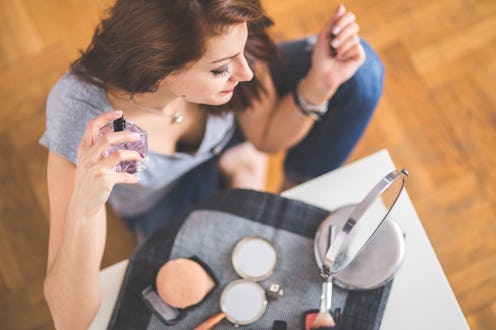Life
7 Hygiene Habits That Are Actually Dangerous

Some habits like showering or washing your bedsheets have obvious health benefits when it comes to good hygiene. We tend to assume that all hygiene habits help make us cleaner and healthier, but there are a number of hygiene habits that are actually pretty dangerous. Sometimes when trying to stay clean, we actually end up harming our bodies or exposing ourselves to more germs. These habits might come as a surprise, but with so much misinformation on the internet, there are a number of practices that become increasingly popular but that aren't actually good for you.
"There is an overwhelmingly continuous outpouring of hygiene info that we may receive from family, friends, colleagues, and other sources," says Nesochi Okeke-Igbokwe, M.D., M.S. over email. "Sometimes it can be truly confusing to determine what is accurate and inaccurate health information. Nonetheless, it is so important to be aware of the hygiene habits that are indeed healthy and the others that are potentially dangerous in order to avoid health problems."
Even though it might feel weird to ditch these habits, it's for the best, especially if you're trying to protect your health in the first place. Here are seven hygiene habits that are actually quite dangerous,
1Long Hot Showers
Many people mistakenly believe that taking a very long and hot shower is good for the skin. "When you shower with extremely hot water, this can actually have a serious drying effect on the skin," says Okeke-Igbokwe. "There are natural oils the skin produces to help it retain moisture, and repeatedly using very hot water or showering for extended periods of time may actually be a detriment to the skin. It can essentially remove many of those oils naturally produced and contribute to rough, dry, and sometimes even irritated skin."
2Using Fragrance Sprays After Going To The Bathroom
Miss Dior Eau De Toilette, $78, Sephora
Spraying a room with a nice scent can seem more hygienic than letting an unpleasant smell linger in the air, but these sprays can actually be quite dangerous for our health. "The American College of Allergy, Asthma, and Immunology warns that many common home fragrance products contain pollutants, which can increase the risk of asthma, trigger eye and respiratory tract irritation, headaches, dizziness, and even memory impairment," says Rachel Delia, co-founder of Flask Natural Products, over email. "Making a switch to an all-natural fragrance spray is a quick and effective healthy swap."
3Cleaning Your Ears
Most of us were taught growing up to clean our ears with q-tips, but it turns out, it's totally unnecessary — and can actually be very dangerous. "It’s unfortunate that ear wax is brown because people assume it’s dirty," says HealthPartners otolaryngology physician Christopher Hilton, MD over email. "But it’s actually healthy and good for us. It kills bacteria and lubricates our ear canals. Ear wax prevents bacteria from causing ear infections." Although you might get some ear wax out with a q-tip, the majority of the wax is actually pushed deeper into your ear canal. This can lead to a vicious cycle of feeling like your ears are dirty, using q-tips, and pushing more wax deeper in your ears.
4Aggressive Tooth Brushing
"Aggressive tooth brushing, especially coupled with an abrasive toothpaste, like most whitening toothpastes, can wear away gum and tooth structure, leading to various dental problems," says dentist Dr. Steven D. Cook over email. "Many people don’t know that they are brushing too hard, potentially causing irreversible damage to their teeth by brushing away the enamel. It can also cause the gums to recede.
5Douching
Douching not only ups your risk of infections like bacterial vaginosis and yeast infections, but it can also complicate pregnancies and increase your risk of pelvic inflammatory disease, according to WomensHealth.gov. It also increases your exposure to chemicals called phthalates, which can be absorbed through the vaginal walls and lead to reproductive problems down the line, according to research published in the journal Environmental Health.
6Using An Air Dryer
Most of us use air dryers after we've washed our hands instead of using paper towels, if the option is available to us. However, paper towels are actually much more sanitary. Multiple studies have found that paper towels remove more bacteria than air dryers, so you might want to choose to wipe your hands rather than dry them.
7Plucking Nose Hairs
No one likes stragglers, but you should proceed with caution before plucking out any nose hairs. Getting rid of unwanted hairs can expose hair follicles to bacteria, which could make you sick, according to Dr. Mehmet Oz in a video on Sharecare. Not only that, but nose hairs help prevent you from inhaling dust and particles.
8Leaving Your Dishes To Soak
Leaving your dishes to soak in the sink might seem like it would make them cleaner, but it could actually be a breeding ground for bacteria. Research from the University of Arizona has found that the kitchen sink contains more E. coli than a toilet after flushing it. Soaking pots and pans can also act as a breeding ground for for E. coli or salmonella, according to research from Long Island College Hospital of Brooklyn, New York.